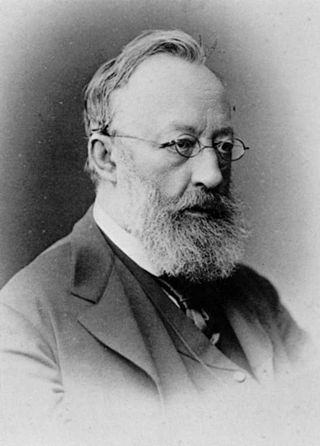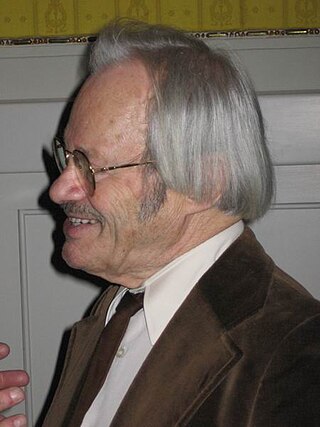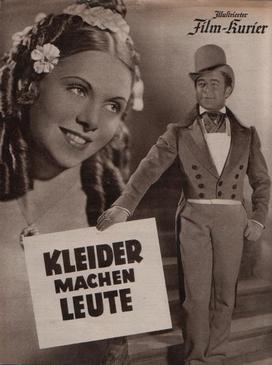
Gottfried Keller was a Swiss poet and writer of German literature. Best known for his novel Green Henry and his cycle of novellas called Seldwyla Folks, he became one of the most popular narrators of literary realism in the late 19th century.

Adalbert Stifter was a Bohemian-Austrian writer, poet, painter, and pedagogue. He was notable for the vivid natural landscapes depicted in his writing and has long been popular in the German-speaking world.

Gottfried John was a German stage, screen, and voice actor. A long-time collaborator of Rainer Werner Fassbinder, John appeared in nine of the filmmaker's projects between 1975 and 1981, the year before Fassbinder's death, including Eight Hours Don't Make a Day, Mother Küsters Goes to Heaven, Despair, The Marriage of Maria Braun, and Berlin Alexanderplatz. His distinctive, gaunt appearance saw him frequently cast as villains, and he is best known to audiences for his role as the corrupt General Arkady Ourumov in the 1995 James Bond film GoldenEye, and for his comedic turn as Julius Caesar in Asterix & Obelix Take On Caesar, the latter for which he won the Bavarian Film Award for Best Supporting Actor.

Friedrich Cerha was an Austrian composer, conductor, and academic teacher. His ensemble Die Reihe in Vienna was instrumental in spreading contemporary music in Austria. He composed several operas, beginning with Baal, based on Brecht's play. He is best known for completing Alban Berg's opera Lulu by orchestrating its unfinished third act, which premiered in Paris in 1979.
Marcel Rubin was an Austrian composer.
Literaturoper, a term coined by the German music critic Edgar Istel, describes a genre of opera that emerged during the late 19th century. When an existing play for the legitimate theatre is set to music without major changes and without the intervention of a librettist, a “Literaturoper” is the result. Although the term is German, it can be applied to any kind of opera, irrespective of style or language.

The Alchemaster's Apprentice is a fantasy novel by Walter Moers, first published in August 2007. It is the fifth of his novels set on the continent of Zamonia, and as in the earlier Ensel and Krete and The City of Dreaming Books, Moers purports to be acting merely as the translator of a work by the Zamonian writer Optimus Yarnspinner. An English translation by John Brownjohn was published in 2010.
Wolfgang Schöne is a German bass-baritone who made an international career in opera and concert, based at the Staatsoper Stuttgart from 1973 to 2005. He created roles in world premiered of operas, in Josef Tal's Die Versuchung at the Bavarian State Opera in 1976, in Hermann Reutter's Hamlet in Stuttgart in 1980, in Henze's Die englische Katze at the Schwetzingen Festival in 1983 and K. in Aribert Reimann's Das Schloß at the Deutsche Oper Berlin in 1992.

Kleider machen Leute is a comic opera in a prologue and two acts by Austrian composer Alexander Zemlinsky. The libretto was written by Leo Feld, based on the 1874 novella of the same name by Gottfried Keller.
Kleider machen Leute may refer to:

Daniel Welbat, alias WellBad, is a German blues rock musician and soundtrack composer.
Hilde Sessak was a German actress who appeared in more than ninety film and television series during her career. She appeared in a number of films during the Nazi era including Quax the Crash Pilot (1941).

Clothes Make the Man is a 1940 German historical comedy film directed by Helmut Käutner and starring Heinz Rühmann, Hertha Feiler and Hilde Sessak. The film is based on the Novella Kleider machen Leute, published by realist author Gottfried Keller in 1874. It was shot at the Barrandov Studios in German-occupied Prague as well as at the Babelsberg and Tempelhof Studios in Berlin.
Clothes Make the Man is a 1921 Austrian-German silent film based on the 1874 novella by Gottfried Keller, directed by Hans Steinhoff and starring Hermann Thimig, Dora Kaiser and Hugo Thimig.
Karl-Rudi Griesbach was a German composer, librettist, dramaturge, music critic and academic teacher.

The Stauffacherin is a Swiss legendary figure. According to Swiss folklore, she was the wife of Werner Stauffacher, the Landammann of the Canton of Schwyz and a founding father of the Old Swiss Confederacy. She was depicted in Friedrich Schiller's 1804 play William Tell as an advisor to her husband, advocating for Swiss independence from Habsburg rule. The image of the Stauffacherin, often viewed as the feminine counterpart to Wilhelm Tell, has become a symbol for Swiss national pride, spiritual national defence, democracy, and women's suffrage.
Kleider machen Leute is a 5-act German opera by Joseph Suder based on Gottfried Keller's 1874 novella of the same name set in Goldach, Switzerland. The opera was composed 1934 but not performed until June 10, 1964, at the Landestheater in Coburg. Suder had already started work on the opera when he discovered that Alexander Zemlinsky had already composed an opera on the same subject premiered in 1910.

Joseph Suder was a German composer. His opera Kleider machen Leute was composed 1926–34 but not performed until 1964.
Clothes Make the Man is a German-language short story or novella by Gottfried Keller. The story comes from Keller's cycle of novellas The People from Seldwyla and first appeared in 1874 in the third volume of the second edition of Keller's cycle. The plot concerns Wenzel, a penniless tailor of Seldwyla who - because of the luxurious suit he has made for himself - is mistaken for a young lord when arriving at the Swiss town of Goldach. The tailor is feted by the townsfolk and attracts the attention of a high-born young woman, Nettchen.
Clothes Make the Man is a 1915 American film featuring Oliver Hardy.










